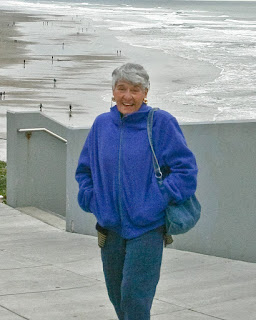OK
So this blog is initially to help support my novel, Ten Years After the Future, coming out on Rogue Phoenix Press, hopefully in February '18.
Of course, more about that later--
It was dedicated to my loving mother Lula Marshall, seen here at 92, at Ocean Beach in San Francisco.
So first, some thoughts on motherhood--
Reduced to its basics, motherhood is mankind's most sacred mission--transferring human genes through procreation to survive into future generations. As biological imperative it is regarded as the most noble and selfless act, nurturing, caring for, and sacrificing on the personal level, so that we all ontologically can flourish and live on. The act is considered pure sacrifice and love.
But can it also be seen as the most special privilege, offering the greatest rewards and satisfaction all on its own? Saying that raising a child is such a 'sacrifice' and as "the hardest job in the world"(well for my mom, perhaps it was), greatly misses the point completely, because raising a child is not a 'job'. Yes, surely, there is exhaustion, boredom, patience, fears and trepidations; but isn't that the case in all meaningful activities as well? I think that by redefining motherhood more as a privilege brings the focus and power back to the woman in the equation and celebrates her independence, power, and autonomy.
Clearly, depending upon the situation, and even child (many women would never have chosen motherhood if it hadn't been forced upon them), many women, for various financial and social determinations have avoided it. But for most it seems, it is the culmination and utmost of life's personal goals. Equating it with martyrdom seems to diminish its power and prestige rather than expand it. I have seen and worked with so many women for whom motherhood, especially when unplanned or unaccompanied by a father/partner is their life's greatest redemption and single-handedly transformed their life's trajectory for the good.
I think that Margaret Atwood's "The Handmaid's Tale" offers a scary, dystopian view of the extension of this value of motherhood as sacrifice. Here, women are grouped as to their function for men. The choices are limited primarily to sterile trophy wives, or fertile 'handmaids', who are repeatedly basically raped for procreation. The act of motherhood here is thoroughly subverted for greater male power. Somewhat by extension, we see this today in the diminished status of the 'child care worker' as a vocation otherwise divorced from motherhood. But both child care, and motherhood are such noble roles, they should both be seen as exalted, empowering protagonists, not selfless martyrs. This also means supporting such things as paid paternal leave, flexible work hours, and publicly funded day care. Martyrs don't need or deserve public services.
If we stop using the language of sacrifice and begin more considering it as the sacred messy privilege that it is, social and political leverage may slowly evolve too.
You may say: 'You're just another male looking in, what do you know', and you'd be right. But watching my own mother, and being at times seemingly her only real joy and project in life, I know that the fulfillment of motherhood for her was often the only thing that kept her going.
And so goes the explanation for the first dedication page of the new book, Ten Years After the Future; to the most brilliant, loving and empowered woman I've ever known. For ultimately, among many other themes, this book is a story of return, redemption, and renewal through the unplanned joy and illumination that is bringing life back into an otherwise at times, cruel, sad world.
I think that Margaret Atwood's "The Handmaid's Tale" offers a scary, dystopian view of the extension of this value of motherhood as sacrifice. Here, women are grouped as to their function for men. The choices are limited primarily to sterile trophy wives, or fertile 'handmaids', who are repeatedly basically raped for procreation. The act of motherhood here is thoroughly subverted for greater male power. Somewhat by extension, we see this today in the diminished status of the 'child care worker' as a vocation otherwise divorced from motherhood. But both child care, and motherhood are such noble roles, they should both be seen as exalted, empowering protagonists, not selfless martyrs. This also means supporting such things as paid paternal leave, flexible work hours, and publicly funded day care. Martyrs don't need or deserve public services.
If we stop using the language of sacrifice and begin more considering it as the sacred messy privilege that it is, social and political leverage may slowly evolve too.
You may say: 'You're just another male looking in, what do you know', and you'd be right. But watching my own mother, and being at times seemingly her only real joy and project in life, I know that the fulfillment of motherhood for her was often the only thing that kept her going.
And so goes the explanation for the first dedication page of the new book, Ten Years After the Future; to the most brilliant, loving and empowered woman I've ever known. For ultimately, among many other themes, this book is a story of return, redemption, and renewal through the unplanned joy and illumination that is bringing life back into an otherwise at times, cruel, sad world.


Comments
Post a Comment